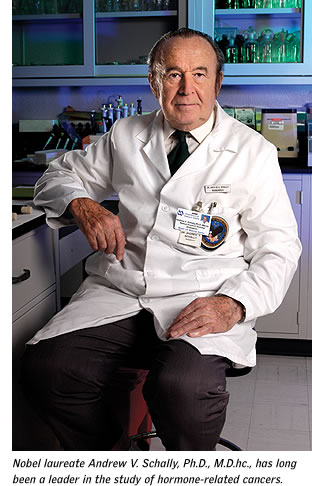 Growth hormone (GH) is vital for normal
human cells. The secretion of GH is controlled by growth
hormone-releasing hormone (GHRH). But when normal cellular
checks and balances fail, GH and GHRH can stimulate cancer
growth. Growth hormone (GH) is vital for normal
human cells. The secretion of GH is controlled by growth
hormone-releasing hormone (GHRH). But when normal cellular
checks and balances fail, GH and GHRH can stimulate cancer
growth.
New research from the University of Miami
Sylvester Comprehensive Cancer Center identifies a protein
receptor that is activated
by GHRH. It plays a key role in the growth of certain
malignancies, including prostate, pancreatic, kidney,
breast, ovarian,
and bone cancer.
Nobel laureate Andrew V. Schally, Ph.D.,
M.D.hc., professor in the Department of Pathology and
the Division of Hematology/Oncology
at the Miller School of Medicine, has long been a leader
in the study of hormone-related cancers. He and his
colleague, Nektarios Barabutis, Ph.D., showed that a
splice variant
(SV1) of GHRH receptor stimulated breast cancer cells.
The research was published in March in the Proceedings
of the National Academy of Sciences USA.
SV1 is a variant of hormone growth factor
receptor—a
protein molecule that “receives” and responds
to GHRH. In a normal setting, GHRH binds to its receptors
in the pituitary gland and stimulates the release of growth
hormone. How GHRH attached to and stimulated cancer cells
wasn’t known.
Schally and his colleagues were able to
show that cells transfected with the SV1 variant were
five times more
likely to stimulate tumor cell growth than control
cells. Identifying
the importance of this splice variant in cancer growth
is critical for developing specific GHRH antagonists
for cancer treatment—the focus of Schally’s career. |